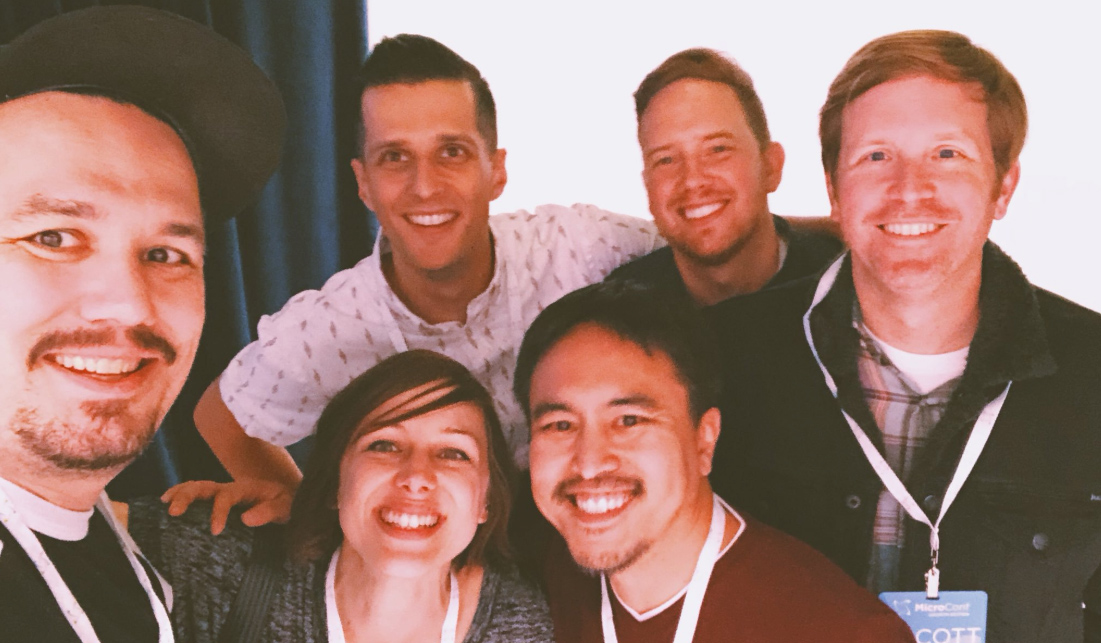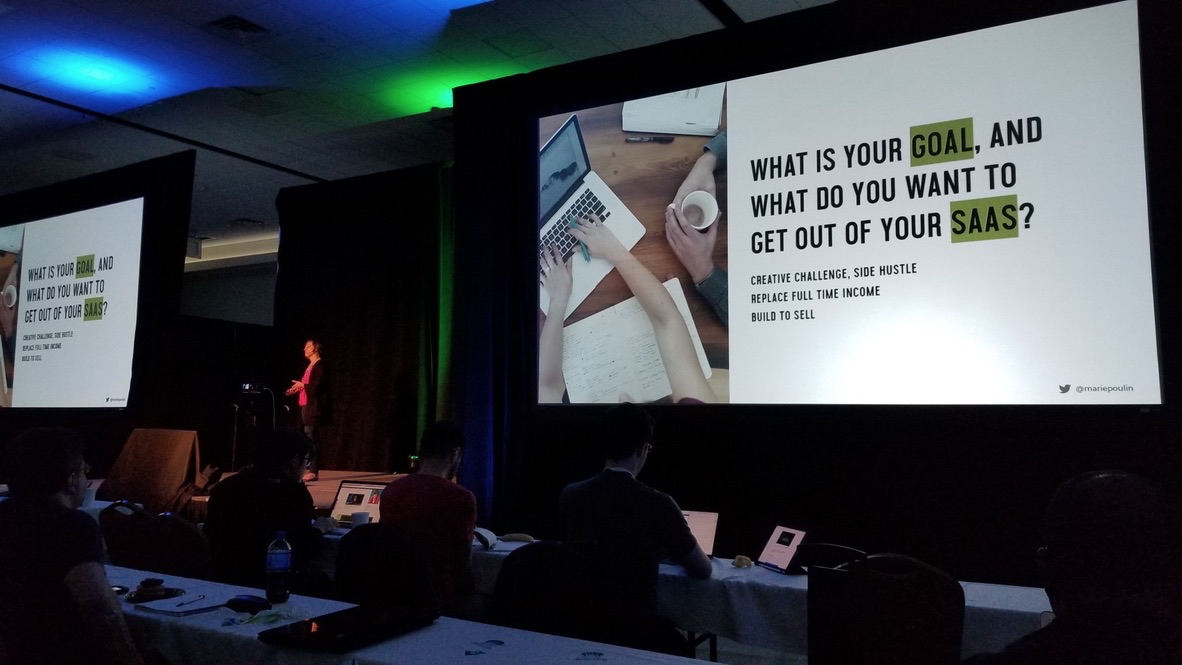I was the community ambassador for MicroConf—one of my favourite conferences—and it was my fourth year attending.
I had done my first big keynote at MicroConf Starter the year before, and here I was at the Growth/Starter mixer party; the after party for the Growth folks combined with the welcome party for the Starter folks.
It's a really great event that gets people of all stages of their business together in one room.
My role as community ambassador? Make the Starter folks feel welcome.
(My secondary role was to keep an eye of pulse of the conference, and look for constructive ways to improve the conference based on feedback and input from attendees)
I remember vividly how intimidated I was when I first attended MicroConf 4 years ago. I was one of only a handful of women in a room full of mostly male developers.
 MicroConf friends. Photo by @andrewculver
MicroConf friends. Photo by @andrewculver
There were people with businesses at all stages of size and scale.
I met people who had spent years working on their alpha product without talking to a single customer, people who had sold their successful software and were looking for a new idea to pursue, and people who were looking for opportunities to buy and grow an existing SaaS businesses.
My mind was blown.
I was being exposed to a completely different world than the one I had been so comfortably familiar with (design, systems, women-led entrepreneur groups).
New jargon. New faces. New ideas. I felt like I'd been let in to a secret society.
It was scary and exciting, because I realized just how little I knew about product development, onboarding, product demos, sales, etc.
I was already well out of my comfort zone, and was in a room full of smarty-pants developers, so I decided that I was going to go for it. I was going to say hello to everyone, and find out what other people were doing.
What are they working on?
- Did they launch their beta yet?
- How did they get their first X users?
- What marketing channels have been working for them?
- What is something they wish they knew before they started?
- What advice would they give folks new to this space?
I knew I needed to make the most of this experience.
It wasn't easy or comfortable, but very quickly I realized that this was a place where people were willing to be honest and share what they'd learned. I also never once felt excluded, "othered," or isolated being a women in a mostly male-dominated space.
I was, however, self conscious because I knew virtually nothing about "growing a software product," but it wasn't long before I realized that my own unique experience and insights carried its own value.
I had launched a mastermind program for designers (several times over several years) that made enough revenue that we decided to use that revenue to bootstrap the creation of our own software product.
I had an ebook, a online courses, online community, retreats, design work, and consulting, and it was all providing healthy revenue and helping fund our product development. It was fun, exciting work, and I loved what I was doing.
I had been a service provider for over a decade, and it was my sweet spot. I was only recently starting to dip my toe into digital products, productized services, and "leveraged" income.
Today our business is well diversified with different types of revenue, and this works really well for us.
We also know it works really well for other people too.
We've been lucky enough to get to see behind the scenes of different types of online businesses, with business owners who have really well leveraged income via online courses, online communities, digital products, coaching, etc.
Those that have the most success have great product-service ecosystems.
Back to the Growth/Starter mixer
I'm 5 minutes into the evening, getting a drink at the bar when a fellow attendee asks me what I do. I tell him that I have a software product, but that the majority of our revenue comes from our client services.
"But that doesn't scale,"
he says.
I have to say I was immediately fascinated by his dismissiveness. His judgement.
His... lack of social tact?
But mostly, I suppose, by his lack of curiosity.
- Who says "scalable" is what I'm seeking?
- Who says services can't scale?
The truth is, Marie of 4 years ago might have been quite rattled by this comment, as it carried a whiff of condescension:
Why on earth would you want to be doing something that doesn't scale?
Why would anyone waste their time on services when you can build software and sit back and make that sweet, sweet recurring monthly revenue?
His comment and the idea that services can't scale was rattling around in my head after the conference. I decided to run this idea by a few online communities to find out (A private facebook group, as well as the paid What Works Network run by Tara Gentile):
- Can services scale? How do you feel about the idea that services-based businesses are inherently "not scalable"?
- Can a business be successful or profitable if it isn't built to scale?
- What are some ways your services business is able to scale?
- Was this person being as rude as I thought he was being?
Some GREAT discussions emerged out of my post.
I think the idea of "scale" has been really blown out of proportion. Services can absolutely scale--they just scale differently than software. Scale doesn't have to equal serving millions of people and ignoring customers. Scale can mean thoughtful systems that allow you to serve more people by employing more people. Anything that helps you build towards both efficiency and serving people better is scale.
— Tara Gentile
People say you can't scale service-based businesses because THEY don't know how, not because it can't be done. There's more than one way to scale. I know first-hand. I'm so tired of the "services aren't scalable" trope. It's very 2004. Over the past 10 years, I've scaled several ways: price, group, and concierge.
— Lena West
I stopped having convos with people who focus on scale. Not because as Tara mentions, it’s not a thing to do, but because the conversation, for me, is about the wrong thing. Profit (again, for me) is an indicator that signals an opportunity to draw the circle bigger. Some might see that as scale. When I draw the circle bigger, it means more people served, more people paid, and more money made. It’s a tool, not the end goal.
lol there are people who actually think that?? Actually really surprises me. Groups, train the trainer, membership, live events, associations just to name a few (yes my model is scalable - coaching and training)
— Christine Gallagher
I also think a lot of people define "service business differently" Seeing as how we coach agencies and service providers on how to be more scalable (in order to scale - note it's not a destination like people make it seem to be) so much of what what makes services scalable is in the productization of the service and where the leverage is created within the delivery process. For example, a full service agency that does everything done for you and all projects are custom is not that scalable.
Remember by definition "scale" as it relates to business means - a noun that means "proportional growth especially of production or profit" and/or "a large market position."So back to the example of the full service done for you agency - (and having been in 7 and 7 figure agencies as well as small agencies) revenues can grow but usually expenses grow equally thus while you can be an 8 figure agency you may still have little profit to show for it... So by definition that is not scalable.
Scalability = ability grow in a profitable way. So, for services, delivering mostly standardized, repeatable offerings for specific avatars leads to scalability both in sales and marketing as well as delivery. Now, on the delivery side, leverage is obtained really in 2 ways. 1) Build a delivery team. These are people that can deliver the parts of the process over and over and over. This is typical more on the agency style, done for you front. 2) Build a team that delivers your IP - this is more the consulting/coaching angle. The delivery team consists of other coaches and consultants teaching IP that was defined previously by the owner/company.
— Greg Hickman
There are plenty of billion dollar service companies. The example I always use because I used to work there is Gensler, the largest architecture firm in the world. Founded by Art Gensler out of his garage in San Francisco in 1965, the firm is now doing $1.2 billion in annual revenue. And that's a small company. Deloitte does $42 billion.
Also, what I’ve found is products, online ones anyway, may take less time and resources to deliver but they take more time and resources to market and sell. Again, to each their own but I prefer to spend more time on delivery.
— Alethea Cheng Fitzpatrick
I also decided to post a Twitter tweetstorm (280 characters was not going to cut it) and got some great replies here too:
There's a dangerous misconception in SaaS that "products" are the only business models that can scale.
— marie poulin (@mariepoulin) April 15, 2019
I believe people forget that for EVERY product scale is a function of how well you are to provide service for the product. If you scale and there's no scaling of a service then you will eventually plateau.
— Nathan Allotey (@nathanallotey) April 15, 2019
I think you’re 💯 on this. Jason Lemkin has written that you should be selling professional services alongside your SaaS, they should be ~20% of your revenue, that your customers want this integration/onboarding/support and not offering will hurt your product sell thru.
— Shane Harter (@shaneharter) April 16, 2019
I mean, literally, the two letters we capitalize are Software and Service. 🤣you’ve given me something to think about!
— Shane Harter (@shaneharter) April 16, 2019
This tweetstorm ended up being one of my most viewed + engaged posts I might have ever posted. Clearly, this idea struck a nerve, and I'm not the only one who sees a problem with this misconception that software is the only scalable business model.
 Those tall blue bars in the middle are when I posted that tweetstorm
Those tall blue bars in the middle are when I posted that tweetstorm
What I know to be true:
Scalable does not necessarily mean PROFITABLE.
I have seen many people spend years building and tinkering on products that haven't taken off. They never reached the point that the effort going in was worth the results. Sure, the model is "scalable," but that doesn't mean the product itself is actually profitable.
I have been a services provider for over a decade—I know how to earn money by helping other people grow and scale their online business. My personal bias leans toward hybrid product-service business models, because I've seen that it works.
- If my immediate goal is to maximize my cashflow, then I know services will always deliver as the quickest way to get cash.
- If my long-term goal is to create more leveraged assets or "passive revenue", then I need financial runway to do so. SERVICES and consulting can give you that immediate financial runway.
What if the profit I make currently across all areas of my business is already really healthy? What if I am not interested in, nor have the capacity for managing the increased demands that come along with scaling (time, energy, resources, skills)?
What if staying small is actually one our competitive advantages?
Paul Jarvis talks about this in his latest book, Company of One:
If you're a company of one, your mind-set is to build your business around your life, not the other way around. For me, being a company of one means not having to bother with infinite growth, since that was never the purpose of my working. Instead, I just focus on maximizing work in way that works for me, which can sometimes mean doing less.
What a treat it was to read this book and realize that I'm not alone in seeing the huge advantages of staying small.
Profit doesn't always increase when you scale up your operations.
Scalable does not necessarily mean ENJOYABLE.
No one else knows what my goals are, life circumstances, habits, experience, revenue, strengths, or even what makes me happy.
I have to admit that I love working with people more than I love working on products. I still enjoy creating products, but not enough to go all in.
I have a pretty good idea of the activities I would need to be doing if I wanted to 10x the software side of my business, and the truth is that I don't want to do them.
Could I hire out those activities? Sure. Probably.
Do I want to? Is that the best move for our business or our lives? I'm not so sure.
Do I wish we had a software product that printed money while we slept? Sure.
But neither Ben nor I would be 100% satisfied to double down on only one product. Maybe we'll feel different with another product, I don't know. For now, we take on activities we want to do! That's the whole point of being self-employed: we have the freedom and capacity to choose.
Our life is pretty chill here in the woods of the Sunshine Coast. We've designed our lives to minimize stress and maximize enjoyability.
Enjoyable + profitable will always trump "the potential to get bigger" everyday.
Scalable does not necessarily mean IMPACTFUL.
Many people are perfectly happy to build products that make money. Full stop.
Scaling a product doesn't necessarily mean you're leaving the world a better place than you found it. And that's fine; there's room for so many different types of creators in the market.
Business is personal. We all have different motivations for wanting to run and grow our own businesses.
Freedom. Flexibility. Earning potential. Creative challenge. Capacity for impact. Independence.
Impact matters to me. Just because a business is scalable, doesn't make it impactful.
I believe that I have more impact through my consulting services than I do through products simply because of the nature of my strengths.
Is "SCALE" really the ultimate goal?
I am not as interested in scale as much as I am in building something that is sustainable, enjoyable, profitable, and impactful.
If studying design thinking and permaculture has taught me anything, you have to start with the end in mind.
What is my goal for my business and my life?
I want to live well while doing work that shapes people's lives and positively impacts communities.
I've done a TON of personal and leadership development around my values and strengths, and I know what I need to thrive. My "Brand of Joy" as Tanya Geisler puts it, is Connection. This is the underpinning desire in everything that I do, and it's underpinned by intimacy, generosity and innovation.
These values guide the way I operate, how I design my business, and the services I choose to offer. Ben is motivated by different values, and so are each of us.
No one knows your business better than you do.
Now look, I'll be the first to admit that my own bias is toward services because of my experience, my skills, and my strengths. But I'm certainly not about to tell another developer that his model is broken because he's not working with people one-on-one, or isn't doubling his rates.
Justin Jackson recently challenged the blanket advice we often give in the software world to "just charge more" in a really excellent Twitter thread and blog post:
"Should we always charge more?" Exploring how we price software. 🌶️
— Justin Jackson (@mijustin) April 13, 2019
(Lots of folks seem to like this one)https://t.co/eMa6fIWsPc
It's tempting to give the same advice over and over and think it applies to everyone, but we forget that every business has its own unique market, strengths, brand equity, quirks, and idiosyncrasies that give something a certain "je ne sais quoi" that is impossible to replicate.
We can learn so much from other businesses if we stay curious and ask better questions.
Oh, tell me more about that?
How did you know to make that decision?
What's been working for you so far?
What have you learned?
What would you do differently?
We all have different motivations, and there is room in the market for different types of founders.
This whole conversation of software, services and scalability was the very topic of my MicroConf keynote last year (The Sustainable SaaS), where I spoke about how doubling down on high-touch services totally changed both the product AND services side of our business.

We (Ben and I) look at our lives and business as an integrated ecosystem. We factor in the health, energy, inputs, outputs of all parts of the ecosystem when we are making decisions, because it's all connected.
We stopped worrying about what we thought we needed to be, and focused on what was already working for us.
